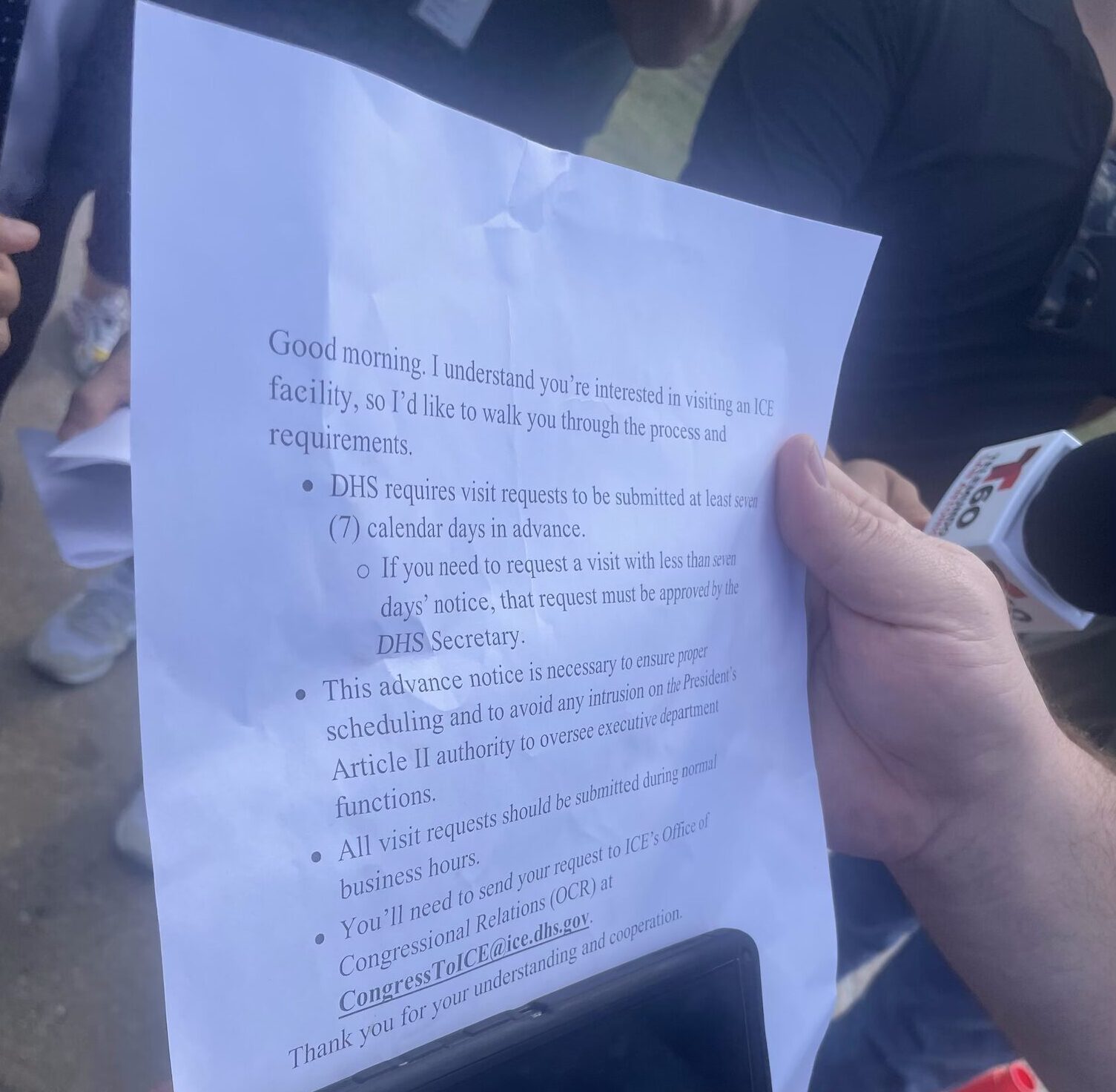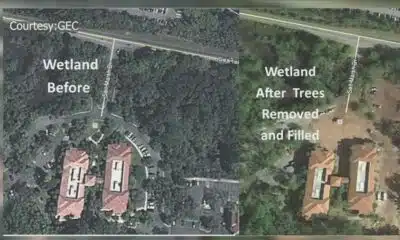News from the South - Texas News Feed
Oil companies want protection if Texas reuses fracking water
“Oil companies want protection as Texas considers allowing treated fracking water released into rivers” was first published by The Texas Tribune, a nonprofit, nonpartisan media organization that informs Texans — and engages with them — about public policy, politics, government and statewide issues.
Subscribe to The Y’all — a weekly dispatch about the people, places and policies defining Texas, produced by Texas Tribune journalists living in communities across the state.
ODESSA — Oil and gas companies are seeking legal shelter as Texas comes closer to using waste brine once considered too toxic for anything other than fracking to replenish Texas’ water shortages.
Legislation filed by state Rep. Drew Darby, R-San Angelo, could give them, transportation companies and landowners such protection.
Darby told a Texas House panel in March his bill will give industries the certainty they need to ramp up treatment of the industrial waste, known as produced water. The full House approved the legislation earlier this year and it is awaiting a Senate debate.
Gov. Greg Abbott and other Republican leaders have made water a priority issue this session. Several proposals aim to increase the state’s water supply, which is under duress from a growing population, climate change and leaking infrastructure. Cleaning produced water is one of several ways lawmakers hope to boost supply.
There is an extraordinary amount of backwash from oil production, which continues to break records, especially in West Texas. For every barrel of oil produced, as many as five barrels of water are captured, Darby told lawmakers on the committee on natural resources, where he introduced the bill.
That water is either reused for fracking or stored underground.
[Can Texas clean up fracking water enough to use for farming? One company thinks so.]
However, industry and legislators have put millions of dollars toward researching treatment methods.
And now, some companies say they have scrubbed out the toxic contaminants to help refill drying bodies of water in West Texas. But the oil and gas industry is hesitating to expand this effort unless it can be sure it is shielded from liability after it hands off the water.
If legislators fail to assure the industry, companies might not want to treat the water and sell it, said Michael Lozano, who leads government affairs at the Permian Basin Petroleum Association.
“Without developing this field with legal certainty, Texas will miss out on millions of barrels of day of treated produced water that could benefit industrial and land application of water uses, which could continue to decrease reliance on fresh water in these sectors,” Lozano said.
Darby’s bill, House Bill 49, says that after an oil company agrees to sell the water for beneficial use by someone else, it is generally not liable if there are consequences later on. Neither are the companies treating the water. The bill also protects landowners who pay to treat the water and sell it, including in cases of personal injury, death, or property damage.
Companies can be liable in some cases, including gross negligence, intentional, wrongful acts of omission, breaking state and federal treatment laws, or failing to meet standards under the Texas Commission on Environmental Quality, the state’s environmental regulator.
It also directs the commission to write more rules outlining how the water should be treated and used.
In a statement to The Texas Tribune, Darby called liability a “key barrier” to expanding produced water treatment, adding the bill “does not shield bad actors — anyone who violates the law or their permit remains fully liable.”
It’s unclear when the state might begin allowing treated produced water into nature. Four treatment companies have applied for permits with the Texas Commission on Environmental Quality to discharge or dispose of produced water into the state’s bodies of water.
Darby’s proposal has set off alarms among environmental policy experts who say that regulators authorizing companies to discharge produced water are not working with enough data to support their decisions.
The commission, which oversees all discharges, including those from oil and gas, has said the agency follows state and federal guidelines. Regulators are also gathering information supplied by the Texas Produced Water Consortium, a research initiative consisting of five pilot projects established by lawmakers in 2021 to study treatment methods of produced water.
The amount of chemicals in produced water varies by sample. Some estimates have detected hundreds, establishing the liquid as one of the most complicated to treat.
Nichole Saunders, senior attorney at the Environmental Defense Fund, said she does not trust the permits to account for every chemical and toxic contaminant. She said the water could still contain dangerous contaminants that the permit does not account for. Regulators and scientists should continue to improve testing before issuing permits, she said.
“We’re basing the responsibility for outcomes on the safety net of our regulatory system with this bill,” she said. “Not on what outcomes might be possible in a best-case scenario.”
Dan Mueller, an engineer and a produced water expert, agreed that there is not enough data to issue permits. Mueller raised concerns about the capability of the treatment technologies, saying the five pilot projects have not been running long enough to ensure they clean the water reliably.
And if the treated water causes environmental or human harm, he said, there are no assurances that the companies that discharge the water can afford to remediate all issues. He says the bill and permits should include financial mechanisms that can cover environmental problems, should they occur.
Without these assurances, “the responsibility to clean up any contamination that might occur is going to fall to the state, and ultimately that falls to the taxpayer, who will have to foot the bill,” he said. “That’s just not right.”
Lozano, with the industry trade group, said there are no existing protections for oil and gas companies that treat and sell the water, adding that treatment gives them another alternative for the excess.
“If this segment of the industry cannot develop and mature, it could impact the record production that has occurred in the Permian Basin,” he said.
Disclosure: Environmental Defense Fund and Permian Basin Petroleum Association have been financial supporters of The Texas Tribune, a nonprofit, nonpartisan news organization that is funded in part by donations from members, foundations and corporate sponsors. Financial supporters play no role in the Tribune’s journalism. Find a complete list of them here.
First round of TribFest speakers announced! Pulitzer Prize-winning columnist Maureen Dowd; U.S. Rep. Tony Gonzales, R-San Antonio; Fort Worth Mayor Mattie Parker; U.S. Sen. Adam Schiff, D-California; and U.S. Rep. Jasmine Crockett, D-Dallas are taking the stage Nov. 13–15 in Austin. Get your tickets today!
This article originally appeared in The Texas Tribune at https://www.texastribune.org/2025/05/19/texas-legislature-produced-water-legal-protections-oil-gas/.
The Texas Tribune is a member-supported, nonpartisan newsroom informing and engaging Texans on state politics and policy. Learn more at texastribune.org.
The post Oil companies want protection if Texas reuses fracking water appeared first on feeds.texastribune.org
Note: The following A.I. based commentary is not part of the original article, reproduced above, but is offered in the hopes that it will promote greater media literacy and critical thinking, by making any potential bias more visible to the reader –Staff Editor.
Political Bias Rating: Centrist
This article provides a balanced perspective on the issue of produced water treatment in Texas. It presents viewpoints from both industry representatives, like Rep. Drew Darby and Michael Lozano, who argue for legal protections to promote water reuse, and environmental experts, such as Nichole Saunders and Dan Mueller, who express concerns about the lack of sufficient data and regulatory safeguards. The article emphasizes the debate between advancing industrial solutions and ensuring environmental and public safety, with no evident ideological bias in favor of one side. It simply reports on the conflicting perspectives surrounding the proposed legislation.
News from the South - Texas News Feed
'Bathroom bill' advances in Texas House days after tensions flared at hearing
SUMMARY: A Texas House panel approved Senate Bill 8, limiting transgender people’s use of bathrooms in government buildings, marking the first House advancement of a “bathroom bill” in over eight years. The bill, backed by Gov. Greg Abbott, passed 9-3 in committee and now heads to the House floor. SB 8 imposes penalties on institutions allowing restroom use not matching sex assigned at birth and extends restrictions to schools, universities, shelters, prisons, and jails. Opponents warn it promotes harassment and violence, while supporters cite protection of women and children. The bill includes measures to shield it from legal challenges. Lawmakers must pass bills by Sept. 13.
The post 'Bathroom bill' advances in Texas House days after tensions flared at hearing appeared first on www.kxan.com
News from the South - Texas News Feed
Texas House Republicans vote against retroactive punishments for quorum breakers
SUMMARY: A week after Texas House Democrats fled to block Republicans’ redistricting vote on the “Big, Beautiful Map,” Republicans are pushing bills to punish or prevent future quorum breaks. Proposed measures include banning fundraising during quorum breaks, vacating seats after seven unexcused absences, and lowering the quorum threshold from two-thirds to a simple majority. While Republicans support these bills, they failed to censure the Democrats. Democrats face fines exceeding $9,000 each for their absence, including costs for Texas DPS efforts to return them. Additionally, a Senate proposal aims to ban fundraising during special sessions to deter quorum breaks and save taxpayer money.
Read the full article
The post Texas House Republicans vote against retroactive punishments for quorum breakers appeared first on www.kxan.com
News from the South - Texas News Feed
Dems in Congress Are Being Denied Access to ICE Facilities. Now They’re Suing.
At least a dozen Democratic members of Congress have been denied entry to federal immigration facilities this year when they showed up to conduct oversight as President Donald Trump has ramped up his mass deportation efforts. Now, they are suing the Trump administration.
The lawsuit was filed in the federal district court for the District of Columbia on July 30 by 12 Democrats from the House of Representatives, including El Paso Congresswoman Veronica Escobar, who has provided oversight of such facilities for several years.
“As part of its campaign of mass deportation, the Trump-Vance administration has stretched the U.S. immigration detention system far beyond its capacity. More people are being held by the United States in immigration detention than ever before, with many facilities housing more individuals than they were built to contain,” the lawsuit states. “Reports of mistreatment have been widespread and have included disturbing details of overcrowding, food shortages, lack of adequate medical care, and unsanitary conditions.”
Since 2019, Congress has adopted statutory provisions stating that the Department of Homeland Security (DHS) may not use federal funds may to prevent members “from entering, for the purpose of conducting oversight, any facility operated by or for the Department of Homeland Security used to detain or otherwise house” noncitizens, per the lawsuit. Those mandates for unfettered oversight were a direct response to Trump’s attempts to block members of Congress under his first administration.
However, since June, several members of Congress have been turned away when attempting to enter and examine federal immigration facilities, including privately run detention centers and ICE field offices where immigrants have been detained.
Escobar currently serves on the House Appropriations Committee and its Subcommittee on Homeland Security, which oversees DHS. In her six years serving Congress, she and her staff members have conducted numerous visits to DHS facilities, and identified issues that saved taxpayers money or improved facility conditions for detainees. Prior to this year, she had only been turned away once, in 2019, from a facility when attempting to conduct oversight.
“It is not acceptable for the Trump administration to ignore the law and limit Congressional oversight and authority; this cannot go unchallenged,” Escobar said in a statement announcing the lawsuit.
U.S. Representative Greg Casar, an Austin Democrat, is among the latest members of Congress to be turned away when requesting to conduct oversight. On August 15, Casar attempted to access the Don T. Hutto Detention Center in Taylor, which is operated by DHS contractor CoreCivic, after receiving complaints that the air conditioning was not functioning properly and that detainees were “boiling.” The congressman, along with Austin-based attorney Andrea Jarero, who was trying to visit a client, were both denied access by CoreCivic.
When journalists, activists, Casar and his staff arrived at the detention facility, CoreCivic employees had blocked off access to the building’s parking lot with traffic cones and two white vans. A CoreCivic employee exited his vehicle and told Casar he’d need to schedule any visits at least seven days in advance. “This advance notice is necessary to ensure proper scheduling and to avoid any intrusion on the President’s Article II authority to oversee executive department functions,” the employee said, reading from a piece of paper.
The statutory provisions of recent DHS appropriations bills explicitly say that they may not “be construed to require a Member of Congress to provide prior notice of the intent to enter a [DHS] facility.” However, per the lawsuit, the Trump administration has unilaterally enacted a new policy that requires seven calendar days’ notice ahead of any visit to a DHS facility.
“What are they hiding, if they will break the law and not let a member of Congress in?” Casar said. “What are they hiding if they’ll violate constitutional rights and not let a lawyer in?”
Casar said that he intends to join his fellow Democratic members of Congress as a plaintiff in the lawsuit—though he has not done so yet.

Texas has the largest immigration detention capacity in the country, putting the state on the front lines of Trump’s mass deportation agenda. As of early August, more than 13,000 immigrants were detained in Texas facilities, according to data from the Transactional Records Access Clearinghouse (TRAC)—far more than any other state. That number will likely continue to grow: a new, $1.24-billion immigrant detention camp opened last week on Fort Bliss, a military base in El Paso, and is poised to be the nation’s largest once it reaches its full capacity to hold 5,000 people. (Escobar was allowed to access that facility on August 18 and said it held 1,000 detainees at that time, though she was not able to speak to any.)
Recent events bring new urgency to immigrant detention inspections: As of late June, 13 people had died in ICE detention this fiscal year—which is the same amount of deaths for the entirety of fiscal year 2024. (A report from several advocacy groups found that dozens of deaths between 2017 and 2021 in ICE detention facilities could have been prevented with adequate medical care.)
Additionally, more people are detained in ICE custody than ever before, and that number will likely continue to grow. The agency is also set to receive historic levels of funding; HR 1, Congress’ recent tax cuts-and-spending bill, contains $75 billion for ICE detention and removal operations.
As spending ramps up, oversight mechanisms have been stifled. Earlier this year, the Trump administration gutted some of the entities tasked with facility oversight, including the Office of the Immigration Detention Ombudsman. Escobar, the El Paso Democratic House member, said oversight is supposed to be multi-layered, but now “Trump has effectively done away with government watchdogs,” she told the Texas Observer.
Since the other agencies tasked with holding DHS accountable in detention centers have had major staff cuts, the role of members of Congress in conducting oversight of immigration detention is more important than ever, she said.
“There’s absolutely no reason for [DHS Secretary] Kristi Noem to block members of Congress from our legal ability to enter a facility unannounced,” Escobar said. “Unless she believes she has something to hide.”
The post Dems in Congress Are Being Denied Access to ICE Facilities. Now They’re Suing. appeared first on www.texasobserver.org
Note: The following A.I. based commentary is not part of the original article, reproduced above, but is offered in the hopes that it will promote greater media literacy and critical thinking, by making any potential bias more visible to the reader –Staff Editor.
Political Bias Rating: Center-Left
The content primarily focuses on criticism of the Trump administration’s immigration policies and their handling of oversight for immigration detention facilities. It highlights Democratic lawmakers’ efforts to conduct oversight and challenge restrictions imposed by the administration, emphasizing issues such as overcrowding, inadequate medical care, and detainee mistreatment. The piece also underscores government watchdog reductions under Trump and conveys skepticism toward officials enforcing access restrictions. While it presents factual information and quotes from Democratic representatives, the overall tone and framing favor a progressive viewpoint critical of conservative immigration enforcement, aligning it with a center-left bias.
-
News from the South - Alabama News Feed6 days ago
U.S. agriculture secretary announces end to subsidies for solar panels on farmland
-
News from the South - Kentucky News Feed6 days ago
First of its kind clinical trial offers new hope for Kentuckians at risk of dementia
-
News from the South - Georgia News Feed7 days ago
Don't eat this shrimp sold at Walmart due to possible radiation contamination: FDA
-
News from the South - Arkansas News Feed6 days ago
Cities across the US are embracing AI guidelines for local government workers
-
News from the South - Alabama News Feed5 days ago
Grants to boost local emergency alert systems in question as public media agency closes
-
News from the South - West Virginia News Feed7 days ago
Free AI testing platform rolled out to federal employees
-
News from the South - Arkansas News Feed6 days ago
‘Alligator Alcatraz’ probed by Dems as ICE detention centers multiply in states
-
Our Mississippi Home6 days ago
MSU Unveils Mixed-Use Development Featuring Boutique Hotel, Cultural Landmark












































